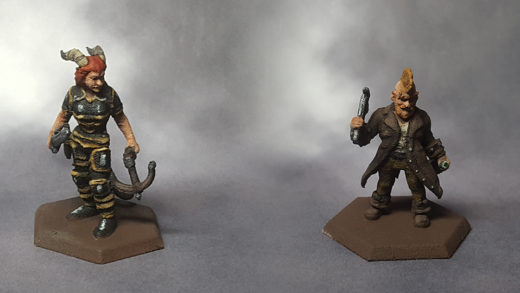Perception, notice, detect, spot, search… Most RPG systems have some sort of skill system for determining a character’s awareness to their surroundings. For some groups, the perception check is more common than any other specific skill check outside of combat. But what are some of the pitfalls to this skill and what happens when it becomes overused?
Active and Passive Checks
Perception is a unique skill in games. Most skills have an active role (pun: active roll) in the game, wherein a player states their intent and dice are rolled to determine success. The skill for noticing is also used passively, in which the GM has players rolling the dice to determine if something is detected–even if the characters may not be certain of what they might need to sense. Active checks are used to help detect traps or hazards, can be a fall-back for tracking, and allow for a quick scan of an area in the hopes of observing a plot point. In games I’ve participated, active checks are rarer than the passive checks, where the GM uses the skill check to verify which characters sense danger coming.
Overuse, Or When The Players See Dangers Coming
One of the biggest problems with passive checks is that it alerts the players to issues in the background. Even if all the rolls are failed, the players are put on their guard and it can be difficult not to “meta-game,” using player knowledge a character may not have. This can often lead to characters being more cautious than they would normally be. That announced “make a perception check” in the middle of a scenario is an alert. One thought might be to have characters constantly making these checks even when not required to the plot, but that is over egging the custard. Constant, unneeded rolls make the game less fun. Is the solution, then, to have the GM make player character perception checks “behind the screen?”
Option 1: Secret Checks, GM Rolls
Some groups handle passive perception checks by having the GM roll for the characters without stating why they’re rolling. This prevents any missed rolls from alerting the players and preventing meta-gaming. The largest complaint is that it takes any sense of agency away from the players. There is an idea that a player should be rolling for everything their character might be doing; even if they’re doing it passively. When the ground quakes, GMs ask players to make rolls for their characters to keep their balance and it’s not the GM who makes the check; the question is then, “why should passive detection be any different?”
Option 2: Secret Checks, Pre-Rolls
A semi-popular option is for players to make 10 rolls at the beginning of the night and write them down on a grid for the GM. These rolls then serve as the player’s rolls for passive checks. It means players are still dependent on their rolls rather than the GMs. To help add randomization, it may be that the GM rolls 1d10 to select the row on the grid. This is, overall, a logical solution, but in practice it’s often felt a bit soulless.
Option 3: Passive Stats, No Rolls
The argument against passive perception is that, if used often (or too often), it can also lead to characters missing important pieces of the plot. A mystery may not make sense due without the clues. A trap or ambush unnoticed can harm a game if it costs a player their character. A different option would be to let the raw stats of a character determine success or failure rather than rolls. This allows the GM to use their fiat to help ensure important plot points aren’t missed, but doesn’t take away player agency as general checks are completely reliant on their character build. That said, this can take some getting used to and some players may balk at not being able to let the dice provide an outcome. This option is my preferred, as it is more beneficial to the story-driven games I like to run.
Actively Passive
While all three options have pros and cons, any could have the additional feature of players being actively passive. A character on watch or on “high alert,” could be given the opportunity to roll their perception check in advance. This could be used as a general check for a time-span or scene in the game or used to establish a modifier to general passive perception checks. For actively passive checks, my preferred method is allowing a user to roll and using it as a bonus to passive stats but failures wouldn’t incur a negative. This gives players an advantage, but is also a reward for their initiative.


Recent Comments